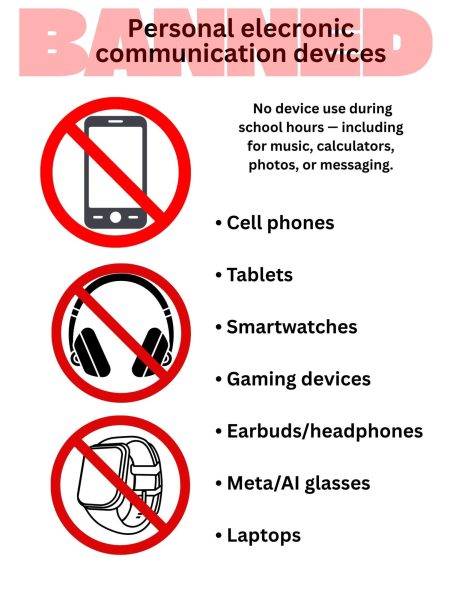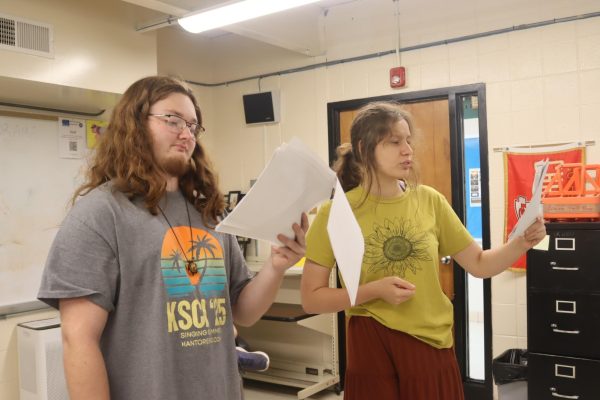School improves standardized test scores in three areas
Students performed better last year on English II and Biology 1 End of Course exams and Technical Skill Attainment exams, the state standardized tests.
Administration and faculty were pleased to see a 20 percent increase in the number of advanced and proficient students on the Biology 1 test and a 16 percent increase on the English II test. WHS also saw a 54 percent increase in proficient and advanced students in TSA testing – the testing used to assess students who complete career and technical programs.
Students took End of Course (EOC) exams in English II, Algebra I, Biology I and Government last April. Juniors (current seniors) took the ACT as their standardized test last April as well. Just recently, the student body has received their EOC and ACT scores. The fact that the school saw an increase in half of the classes involved with EOC scores has boosted the confidence of many students.
“EOC scores are important to our school because they represent the education we get and how much we’re learning,” senior Kaitlyn Laue said. “I’m actually aiming for a 24 on the ACT this year, because then I’ll get an automatically into the nursing program at UCM.”
Last year was also the first year all high school juniors in the state took the ACT. Warsaw students’ average score on the ACT was 17.9. This is below the state average score of 19.4
Students in English II had a 16 percent increase from last year on their EOC, scoring on average a 73.5 percent proficient and advanced, which is just below the 73.7 percent Missouri state average. In Algebra I, the average dropped to 51.8 percent proficient and advanced, which is lower than the state average of 62 percent. Another increase in scores was for Biology I, which has a 20 percent increase to 66 percent proficient and advanced students, which is still below the state average of 74.3 percent. As for the last subject tested, Government students scored with 47.9 percent proficient and advanced compared to the statewide average of 56.9 percent.
Despite the school’s improvement, some are still raising their expectations for the school and themselves.
“There’s always room for improvement,” Claudia Schmitz said about WHS ACT scores, “Twenty-three sounds like a good goal to set for us this year.”
“This shows that our school is expanding and gradually getting better,” said junior Nate Townley.
Townley has set a goal for his ACT.
“If I get above 21, I’ll be ecstatic,” he said.
Nerves are also a common result of test-taking season.
“I am a little nervous, but I’m still confident in myself,” junior Nate Townley said. Townley will be taking the ACT as part of his standardized testing this year.
Some students took the ACT prior to their junior year to improve their score. In addition to being a standardized test for the school, the ACT is used by many colleges to determine a student’s college readiness.
“Take the ACT as many times as you can. Like Chad Cargill says, every four times you take the ACT, your score goes up two points,” math teacher Brian Hrabe said. “I think my class did okay last year, but there is always room for improvement. Just when the test comes, don’t be too stressed out. Trust in yourself.”
Seniors who have already taken their ACT many times, such as Payton Adair and Claudia Schmitz, admit that although they were nervous their first times, they’ve gotten used to the testing atmosphere and find it easier to take each time. However, for some, no matter how many times they have tested, the nerves never go away.
“I was very nervous my first year,” Laue said. “I’m actually still nervous this year because now I’m just losing time to take it.”
Despite the inevitable nerves and anticipation, there’s still advice out there that can help students marginally when it comes to taking tests.
“The first time I took the test was my sophomore year and I was nervous. But the more you take it, the more you get used to it, and the easier it gets,” senior Payton Adair said. “Just make sure you get lots of sleep, and practice as many questions as you can.”
Adair’s advice is also supported by popular studies. Scientists suggest students get nine hours of sleep, which contradicts the average amount of seven hours that children actually get according to nationwidechildrens.org. Studies also show that students, on average, should study two hours a day in order for significant grade increase.
EOC Scores
| 2013 | 2014 | 2015 | ||
| English II | 68.4% | 57.4% | 73.5% | 16.1% increase from 2014 |
| Biology 1 | 69.1% | 46% | 66% | 20% increase from 2014 |
| Algebra 1 | 57.5% | 59.5% | 51.8% | 7.7% decrease from 2014 |
| Government | 56.9% | 65.7% | 47.9% * | 17.8% decrease from 2014 |
| TSA | 7.6% | 61.6% | 54% increase from 2014 |
Results reflect the percentage of WHS students who achieved advanced or proficient scores on the EOC test.
* Government went to semester testing

Ally Estes is a senior with a passion for the liberal arts. She currently attends Warsaw High but plans on attending Graceland University in Iowa,...






